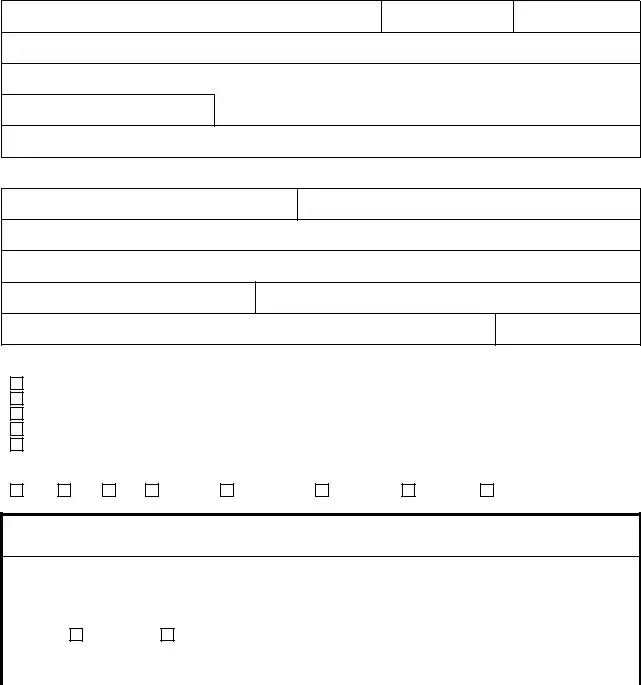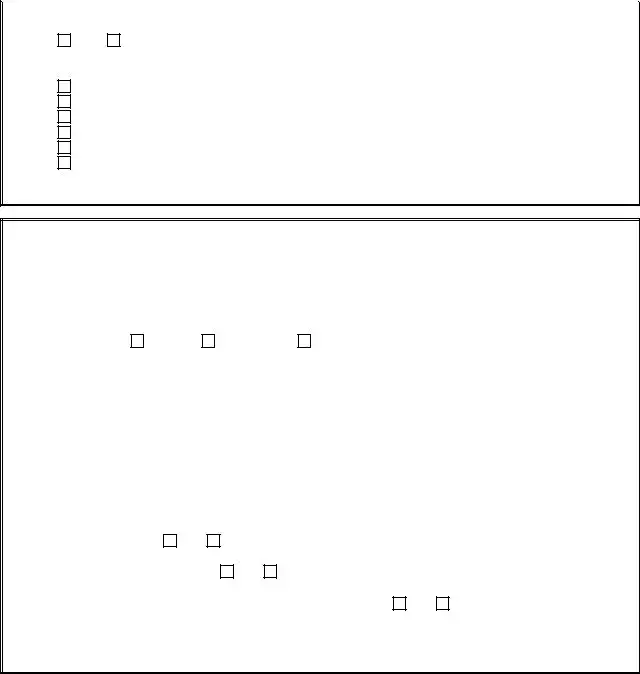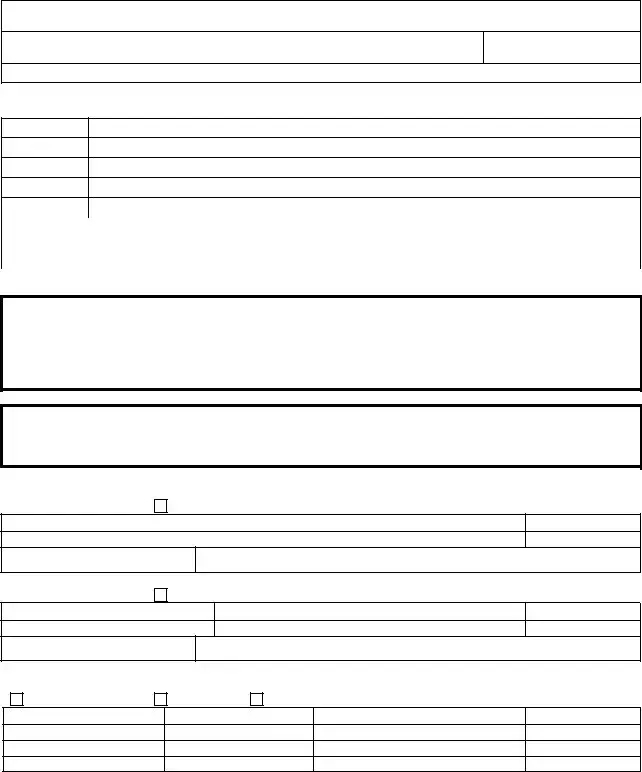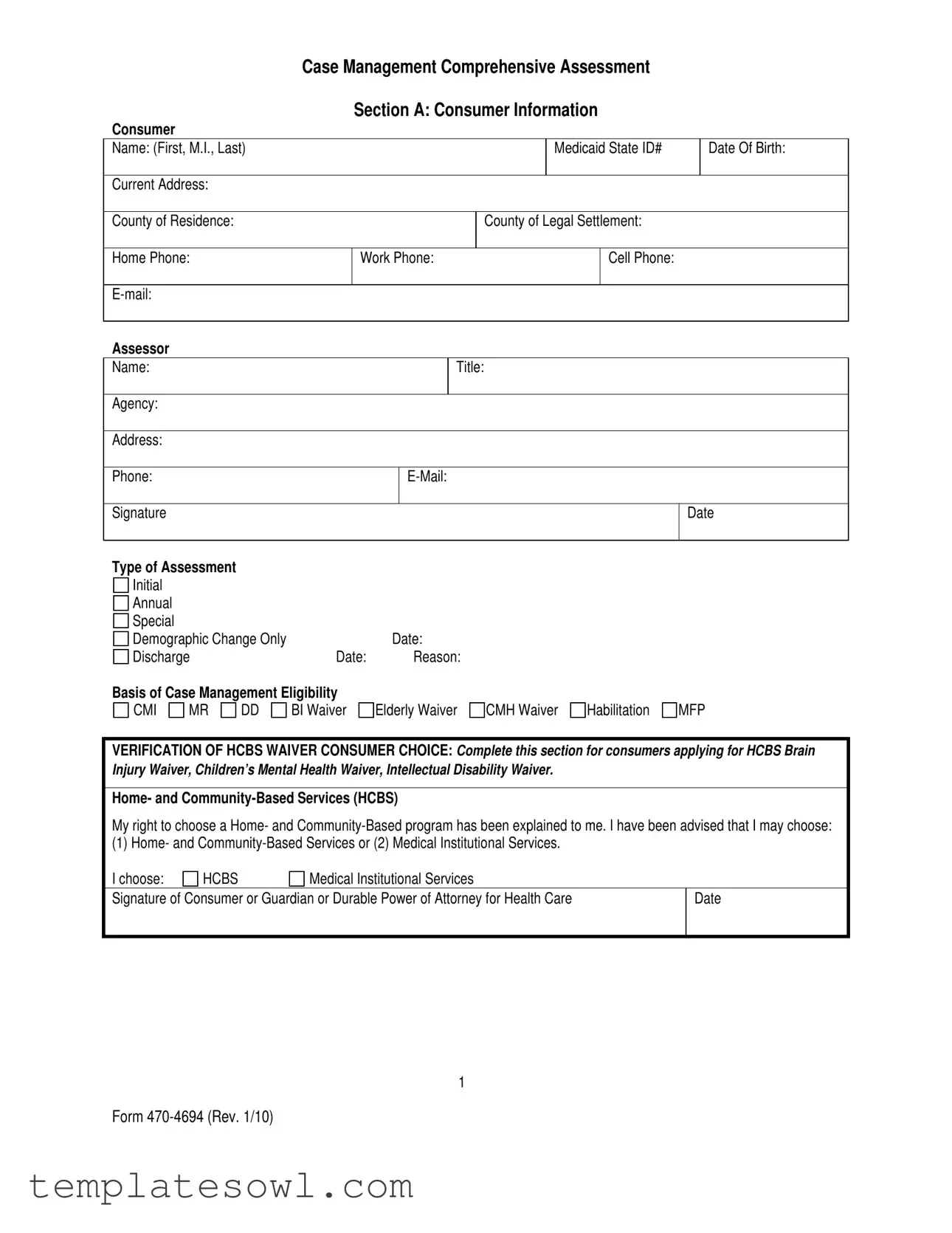Fill Out Your Case Management Assessment Form
The Case Management Assessment form plays a vital role in organizing and evaluating a consumer’s needs within various support programs. It begins by gathering essential consumer information, including personal details, eligibility for case management services, and the type of assessment being conducted. Important demographic data—such as age, income, and language needs—provides a comprehensive view of the consumer's situation. The form also allows for the identification of a legal decision-maker and emergency contacts, ensuring that all necessary parties are involved in the case management process. For consumers qualifying for Home- and Community-Based Services (HCBS), a section on consumer choice gives them the opportunity to express their preferences for care. Medical history is assessed through a series of questions regarding diagnoses and healthcare providers, enabling case managers to tailor services effectively. Overall, this form not only streamlines the assessment process but also emphasizes the consumer's rights and preferences, ensuring a person-centered approach in service provision.
Case Management Assessment Example

Case Management Comprehensive Assessment
Section A: Consumer Information
Consumer
Name: (First, M.I., Last)
Current Address:
Medicaid State ID#
Date Of Birth:
County of Residence:
Home Phone:
|
County of Legal Settlement: |
|
|
|
|
Work Phone: |
|
Cell Phone: |
|
|
|
Assessor
Name:
Agency:
Address:
Phone:
Signature
Title:
Date
Type of Assessment |
|
|
|
|
Initial |
|
|
|
|
Annual |
|
|
|
|
Special |
|
|
|
|
Demographic Change Only |
|
Date: |
||
Discharge |
|
Date: |
Reason: |
|
Basis of Case Management Eligibility |
|
|||
CMI |
MR |
DD |
BI Waiver |
Elderly Waiver |
CMH Waiver
Habilitation
MFP
VERIFICATION OF HCBS WAIVER CONSUMER CHOICE: Complete this section for consumers applying for HCBS Brain Injury Waiver, Children’s Mental Health Waiver, Intellectual Disability Waiver.
Home- and
My right to choose a Home- and
(1) Home- and
|
I choose: |
HCBS |
Medical Institutional Services |
|
|
Signature of Consumer or Guardian or Durable Power of Attorney for Health Care |
Date |
||
|
|
|
|
|
1
Form

Case Management Comprehensive Assessment
Consumer Name:
Interdisciplinary team members consulted (including consumer):
Name
Title (if applicable)
Relationship to Consumer
Additional records reviewed:
Consumer Demographics
Gender: |
Female |
Male |
Language:
Speaks English
Understands English
Needs interpreter services
Comments:
Yes
No
Monthly Income: (Please check all that apply) |
|
Source |
Amount |
SSI |
$ |
SSDI |
$ |
Employment |
$ |
Other (specify): |
$ |
Comments: |
|
Court Involvement: |
|
Involuntary Commitment |
|
Probation or Parole |
|
Child in Need of Assistance (CINA) |
|
Child Protection |
|
Delinquency |
|
Foster Care |
|
Other (Identify) |
|
None |
|
Comments: |
|
2
Form

Case Management Comprehensive Assessment
Consumer Name:
Legal decision maker: (Please check all that apply)

 None
None 
 Guardian
Guardian 

Other (Specify):
Address:
Home Phone:
Work Phone:
Cell Phone:

 Guardian
Guardian 

Other (Specify):
Address:
Home Phone:
Work Phone:
Cell Phone:
Financial Decision Maker: (e.g. Conservator or |
No |
Name: (First, M.I., Last) |
|
Yes
(complete below)
Address: |
|
|
|
|
|
|
|
|
|
Home Phone: |
|
|
Work Phone: |
Cell Phone: |
|
|
|
|
|
|
|
|
|
|
|
|
|
|
|
Payee: |
No |
Yes (complete below) |
|
|
Name: (First, M.I., Last) |
|
|
|
|
|
|
|
|
|
Address: |
|
|
|
|
|
|
|
|
|
Home Phone: |
|
|
Work Phone: |
Cell Phone: |
|
|
|
|
|
|
|
|
|
|
|
|
|
|
|
Emergency Contacts: |
|
|
|
|
Primary Contact |
|
|
|
|
Name: (First, M.I., Last) |
|
|
Relationship: |
|
|
|
|
|
|
Address: |
|
|
|
|
|
|
|
|
|
Home Phone: |
|
|
Work Phone: |
Cell Phone: |
|
|
|
|
|
|
|
|
|
|
|
|
|
|
|
3
Form

Case Management Comprehensive Assessment
Consumer Name:
Secondary Contact (if applicable):
Name: (First, M.I., Last) |
|
Relationship: |
|
|
|
Address: |
|
|
|
|
|
Home Phone: |
Work Phone: |
Cell Phone: |
|
|
|
|
|
|
|
|
|
|
|
|
Complete This Section For Adults (Age 18 and Over)
Veteran:
Yes
No
Marital Status: |
|
Never Married |
|
Married |
Spouse’s Name: |
Divorced |
|
Legally Separated
Widowed
Unknown or Other – Specify
Comments:
Complete This Section For Children (Age 17 and Under)
With whom does the child live?
(If the child currently lives in a institutional setting, please make note in the comments section below.)
What are the child’s parent’s names?
Parents marital status: |
Married |
Divorced |
Never married |
If the parent’s are not living together, what is the
Street:
City, State, Zip:
Parent’s contact information (if different from the child’s):
Home Phone:
Work Phone:
Cell Phone:
Are there siblings in the home? |
Yes |
No |
|
Are any siblings receiving waiver services? |
Yes |
No |
|
Are there any individuals who are not supposed to have contact with the child? If yes, specify:
Other Comments:
Yes
No
4
Form

Case Management Comprehensive Assessment
Consumer Name:
Medical Information
Diagnoses:
Medical:
Diagnosis
Name and credential of professional making diagnosis:
Date of diagnosis:
Comments:
Mental Health
Axis 1:
Axis 2:
Axis 3:
Axis 4:
Axis 5:
Name and credential of professional making diagnosis: |
Date of diagnosis: |
|
|
Comments: |
|
Complete this section for consumers applying for or receiving HCBS Intellectual Disability Waiver.
List the most current IQ score, or if the IQ isn’t listed, give the consumer’s level of functioning within the range of mental retardation (mild, moderate, severe, profound):
IQ: |
Range: |
Date of Evaluation: |
Complete this section for consumers applying for or receiving HCBS Brain Injury Waiver.
Diagnosis: |
Date Injury Occurred: |
Health Care Provider Information:
Who is your regular doctor? |
None |
|
Name |
|
Address |
|
|
|
Phone
Date of last visit (if known):
Reason:
Who is your regular dentist?
Name
None
Address
Phone
Date of last visit (if known):
Reason:
Are you seeing any other doctors, such as a psychiatrist, or specialists of any kind?
Yes (list below) |
No |
Don’t know |
Name
Specialty
Address
Phone
5
Form

Case Management Comprehensive Assessment
Section B: Medical and Physical Health
Health Conditions
B1. Overall, how would you rate your physical health? |
|
|
|
||
Excellent |
Good |
|
Fair |
Poor |
No Response |
Comments: |
|
|
|
|
|
B2. Do you have any health problems that require assistance to manage?
Cardiac
Skin Related
G.I. Disorders
Urinary Tract
Weight problems
Evidence of communicable disease
Other – Specify
None
How do they affect you and how long have you had them?
Comments:
B3. Any respiratory problems that require assistance to manage?
Ventilator
Oxygen
Suctioning
Tracheotomy
Cardiorespiratory monitor
Chest physiotherapy
Nebulizer treatment
Other – Specify
None
How do they affect you and how long have you had them?
Comments:
B4. Do you regularly receive any of the following medical treatments?
Days per week |
Hours per day |
Nursing |
no |
yes |
Physical Therapy |
no |
yes |
Occupational Therapy |
no |
yes |
Speech Therapy |
no |
yes |
Supervision for Safety |
no |
yes |
Diabetes Education |
no |
yes |
Dialysis |
no |
yes |
Respiratory Treatment |
no |
yes |
Catheter Care |
no |
yes |
Colostomy Care |
no |
yes |
Nasogastric Tube Care |
no |
yes |
Other |
no |
yes |
6
Form

Case Management Comprehensive Assessment
Consumer Name:
B5. Hearing
No hearing impairment.
Hearing impairment, but managed through assistive devices
Hearing difficulty at level of conversation.
Hears only very loud sounds.
No useful hearing.
Not determined.
Comments:
B6. Vision
Has no impairment of vision.
Vision impairment, but managed through assistive devices
Has difficulty seeing at level of print
Has difficulty seeing obstacles in environment
Has no useful vision.
Not determined.
Comments:
B7. Speech/Communication
Communicates independently or impairment has been compensated to function independently.
Communicates with difficulty but can be understood.
Communicates with sign language, symbol board, written messages, gestures or an interpreter.
Communicates inappropriate content, makes garbled sounds, or displays echolalia.
Does not communicate.
Comments:
B8. Sensory Perception (e.g. – taste, smell, tactile, spatial)
No impairment
Impaired – Specify
Comments:
B9. Cognitive Status
Alert and fully oriented
Alert and oriented with significant alteration on
Generally oriented through use of assistive techniques
Cognitive deficits (e.g. orientation, attention/concentration, perception, memory, reasoning)
Exhibits mental status changes consistent with psychiatric disorder
Comatose, but responsive
Comatose, but unresponsive
Other – Specify
Comments:
B10. Musculoskelatal/Fine or Gross Motor Skills
No Impairment of Musculoskelatal/Fine or Gross Motor Skills |
|
|||
Impaired muscle tone |
|
|
|
|
Contractures |
|
|
|
|
Scoliosis |
|
|
|
|
Paralysis: |
Hemiplegia |
Paraplegia |
Quadriplegia |
Other (Specify) |
Comments:
7
Form

Case Management Comprehensive Assessment
Consumer Name:
Complete This Section For Adults (Age 18 and Over)
|
B11. Do you have someone who could stay with you for a while if you were sick or needed help? |
|
|
|
|
||
|
|
Yes (Complete below) |
No |
|
|
|
|
|
|
Name: |
Relationship: |
|
|
|
|
|
|
Address: |
|
|
|
|
|
|
|
City, State, Zip code: |
|
|
|
|
|
|
|
Phone: |
|
|
|
|
|
|
B12. Is there anybody you would not want to be involved with your care if you were sick or needed help? |
|
|
|
|
||
|
|
Yes (Complete below) |
No |
|
|
|
|
|
|
Name: |
Relationship: |
|
|
|
|
|
|
|
|
|
|
|
|
|
|
|
|
|
|
|
|
|
|
|
HEALTH CONDITIONS RISK FACTORS |
|
|
YES |
NO |
|
|
|
|
|
|
|
|
|
R1. |
Has the consumer had a seizure in the past year? |
|
|
|
|
|
|
R2. |
Does the consumer have a diagnosis of any other serious medical conditions or other serious health |
|
|
|
|
|
|
|
concerns (i.e., diabetes, cerebral palsy, heart condition, etc.)? |
|
|
|
|
|
|
|
If yes, list all conditions/concerns: |
|
|
|
|
|
|
R3. |
Does the consumer have any life threatening allergies (such as peanuts, bee stings, or shellfish)? |
|
|
|
|
|
|
R4. Is the consumer in need of a primary health care provider (or the provider’s contact information is |
|
|
|
|
||
|
|
|
|
|
|||
|
|
unknown)? |
|
|
|
|
|
|
|
|
|
|
|
|
|
|
R5. |
Is the consumer in need of a dentist (or dentist’s contact information is unknown)? |
|
|
|
|
|
|
R6. Is the consumer in need of a specialist (or the specialist’s contact information is unknown)? |
|
|
|
|
||
|
R7. |
Has the consumer had difficulty making, keeping, or following through with appointments in the last year? |
|
|
|
|
|
|
|
|
|
|
|
|
|
|
R8. |
In the past year, has the consumer gone to a hospital emergency room? |
|
|
|
|
|
|
|
|
|
|
|||
|
|
If yes, how many times? |
Why? |
|
|
|
|
|
|
|
|
|
|
||
|
|
|
|
|
|
|
|
|
R9. |
In the past year, has the consumer stayed overnight or longer in a hospital? |
|
|
|
|
|
|
|
If yes, how many times? |
Why? |
|
|
|
|
|
R10. Is the consumer in need of someone to help if he or she was sick or injured? |
|
|
|
|
||
Comment on any risk factors marked as “Yes” and address the issue in the Crisis Intervention Plan. |
|
|
No. of risks: |
||||
Comments: |
|
|
|
|
|
||
8
Form

Case Management Comprehensive Assessment
Consumer Name: |
|
|
|
|
|
Medication Use |
|
|
|
|
|
B13. Are you currently taking any prescription medication? |
Yes (complete below) |
No |
|||
Medication Name |
Dosage |
|
Frequency |
|
Purpose |
|
|
|
|
|
|
|
|
|
|
|
|
|
|
|
|
|
|
|
|
|
|
|
|
|
|
|
|
|
|
|
|
|
|
|
|
|
|
|
|
|
|
|
|
|
|
|
|
|
|
|
|
|
|
|
|
|
|
|
|
|
|
|
|
|
|
|
|
|
|
|
|
|
|
|
|
|
|
|
|
|
|
|
|
|
|
|
|
|
|
|
|
|
|
|
|
Comments:
B14. Are you currently taking any
Yes (complete below) 
 No
No
Medication Name
Dosage
Frequency
Purpose
Comments:
9
Form

Case Management Comprehensive Assessment
Consumer Name:
Complete this section only if the consumer is taking medications.
B15. Are any of your medications kept in a special place, like a locked container or the refrigerator?

 Yes
Yes 
 No Comments:
No Comments:
B16. |
What pharmacy do you use? |
|
|
B17. |
How do you remember to take your medications? (Check all that apply.) |
|
|
|
By following directions |
Calendar |
|
|
Caregiver gives them |
Bubble wrap/Blister Pack |
|
|
Medpass Machine |
Egg Carton, envelopes |
Other: |
Comments:
B18. How well do you
With no help or supervision
With some help or occasional supervision
With a lot of help or constant supervision
Unable to administer own medications/caregiver gives them
Comments:

 RN
RN
|
|
MEDICATION ERROR RISK FACTORS |
|
|
|
YES |
|
NO |
|
||||
|
|
|
|
|
|
|
|||||||
|
3 = Frequently 2 = Sometimes 1 = Rarely 0 = Never |
|
|
3 |
|
|
2 |
1 |
|
|
0 |
|
|
|
|
|
|
|
|
|
|
|
|
|
|
||
|
R11. |
Has the consumer had problems with not taking or not receiving medications on time? |
|
|
|
|
|
|
|
|
|
|
|
|
|
|
|
|
|
|
|
|
|
|
|
|
|
|
R12. |
Has the consumer had problems with taking or being given the incorrect number of |
|
|
|
|
|
|
|
|
|
|
|
|
|
|
|
|
|
|
|
|
|
|
|
||
|
|
medications? |
|
|
|
|
|
|
|
|
|
|
|
|
|
|
|
|
|
|
|
|
|
|
|
|
|
|
|
|
|
|
|
|
|
|
|
|
|
|
|
|
|
|
|
|
|
|
|
|
|
|
|
|
|
|
R13. Has the consumer had problems with medications not being refilled on time? |
|
|
|
|
|
|
|
|
|
|
|
|
|
|
|
|
|
|
|
|
|
|
|
|
|
|
|
R14. Have there been issues with medications not being |
|
|
|
|
|
|
|
|
|
|
|
|
|
|
|
|
|
|
|
|
|
|
|
|
|
|
|
R15. |
Has the consumer had significant side effects from medications? |
|
|
|
|
|
|
|
|
|
|
|
|
|
|
|
|
|
|
|
|
|
|
|
|
|
|
R16. |
Has the consumer had significant medication changes in the past year? |
|
|
|
|
|
|
|
|
|
|
|
|
|
|
|
|
|
|
|
|
|
|
|
|
|
|
R17. |
Has the consumer refused or spit out medications? |
|
|
|
|
|
|
|
|
|
|
|
|
|
|
|
|
|
|
|
|
|
|
|
|
|
|
R18. |
Have there been problems with drug interactions? |
|
|
|
|
|
|
|
|
|
|
|
|
|
|
|
|
|
|
|
|
|
|
|
||
|
|
|
|
|
|
|
|
|
|
|
|
|
|
|
R19. Has the consumer experienced health problems because of missing/refusing |
|
|
|
|
|
|
|
|
|
|
|
|
|
|
medications? |
|
|
|
|
|
|
|
|
|
|
|
|
|
|
|
|
|
|
|
|
|
|
|
|
|
|
R20. |
Has the consumer misused prescription or |
|
|
|
|
|
|
|
|
|
|
|
|
|
|
|
|
|
|
|
|
|
|
|
||
|
|
many at once)? |
|
|
|
|
|
|
|
|
|
|
|
|
|
|
|
|
|
|
|
|
|
|
|
|
|
|
|
|
|
|
|
|
|
|
|
|
|
|
|
|
|
|
|
|
|
|
|
|
|
|
|
|
|
|
R21. |
Has the consumer taken another person’s prescription medications? |
|
|
|
|
|
|
|
|
|
|
|
|
|
|
|
|
|
|
|
|
|
|
|
|
|
|
R22. |
Has the consumer used |
|
|
|
|
|
|
|
|
|
|
|
|
R23. Has the consumer used multiple pharmacies or multiple physicians in the past year? |
|
|
|
|
|
|
|
|
|
|
|
|
|
|
|
|
|
|
|
|
|
|
||||
|
Comment on any risk factors marked as “Yes” and address the issue in the Crisis |
|
|
No. of risks: |
|
|
|
|
|
||||
|
Intervention Plan. |
|
|
|
|
|
|
|
|
|
|
|
|
|
Comments: |
|
|
|
|
|
|
|
|
|
|
|
|
10
Form
Form Characteristics
| Fact Name | Fact Description |
|---|---|
| Purpose | The Case Management Comprehensive Assessment form is designed to evaluate individual needs for home and community-based services. |
| Consumer Information | This section collects vital information such as the consumer's name, address, and contact details, ensuring accurate identification and communication. |
| Eligibility Basis | Eligibility for services is determined based on categories like Medical Assistance, Mental Retardation, and various waivers, including Elderly and Brain Injury Waivers. |
| Interdisciplinary Team | The form requires input from an interdisciplinary team, ensuring diverse perspectives and comprehensive care planning for the consumer. |
| Consumer Choice | Consumers can express their preference between Home- and Community-Based Services or Medical Institutional Services, promoting autonomy in decision-making. |
| Demographic Data | Key demographic details must be captured, including language proficiency and gender, to tailor services effectively. |
| Legal Representation | The form identifies legal decision-makers, ensuring that consumers have appropriate representation in matters concerning their care. |
| Emergency Contacts | Designated emergency contacts are documented to ensure quick communication in case of urgent situations involving the consumer. |
| Medical History | Detailed medical information, including diagnoses and healthcare providers, is gathered to adequately address the consumer's health needs during case management. |
Guidelines on Utilizing Case Management Assessment
Once the Case Management Assessment form is filled out completely, it is important to submit it to the relevant agency or provider for processing. The information collected on this form will help in organizing the necessary supports and services for the consumer, ensuring that their needs are efficiently addressed.
- Consumer Information: Fill in the consumer's name, current address, Medicaid State ID#, date of birth, county of residence, and contact information (home phone, work phone, cell phone, and email).
- Assessor Information: Complete the assessor's name, title, agency, address, phone number, email, and signature date.
- Type of Assessment: Select the assessment type (Initial, Annual, Special, Demographic Change Only), and enter the relevant dates for assessment and discharge.
- Basis of Case Management Eligibility: Check the applicable eligibility categories (CMI, MR, DD, BI Waiver, etc.).
- HCBS Waiver Consumer Choice: Review the statement about choosing between HCBS and Medical Institutional Services. Mark your choice, and ensure the consumer or authorized representative signs and dates this section.
- Interdisciplinary Team Consultation: List the team members consulted, noting their names, titles (if applicable), and relationship to the consumer.
- Consumer Demographics: Record the consumer's gender, language skills (including interpreter needs), monthly income sources and amounts, and any relevant court involvement.
- Legal Decision Maker Information: Indicate if there’s a legal decision maker, and provide their name and contact details if applicable.
- Emergency Contacts: Provide details for primary and secondary emergency contacts, including their names, relationships, addresses, and contact information.
- Additional Information for Adults/Children: For adults, indicate veteran status and marital status. For children, specify living arrangements, parents’ names, and any relevant custody details.
- Medical Information: Document any diagnoses along with the professional credentials of the diagnosing party, dates, and any additional comments.
- Health Care Provider Details: List the consumer's regular doctor and dentist. Include their names, addresses, phone numbers, and dates/reasons for the last visits. Add any other doctors or specialists being seen.
What You Should Know About This Form
What is the purpose of the Case Management Assessment form?
The Case Management Assessment form serves as a comprehensive tool to gather essential information about consumers seeking case management services. It captures personal details, medical history, and legal considerations, creating a complete picture of the individual's needs. This information helps assess eligibility for various Home- and Community-Based Services (HCBS) and ensures that the services provided align with the consumer's specific circumstances and preferences.
Who needs to fill out the Case Management Assessment form?
The form must be completed by consumers intending to access case management services, which may include various waivers for individuals experiencing disabilities or elderly individuals. Additionally, guardians or legal representatives will also need to complete sections of the form if the consumer is unable to provide the necessary information due to age or condition.
What kind of information is required on the form?
The assessment form requests a variety of information such as the consumer's name, address, contact details, and demographic data like age and gender. It also requires details about the consumer's medical history, diagnoses, court involvement, and financial status. Emergency contacts, caregivers, and decision-makers should also be listed, ensuring a holistic understanding of the individual’s support system and legal considerations.
How does the HCBS choice section work?
The HCBS choice section is designed to inform consumers about their options for service delivery. The consumer can choose between Home- and Community-Based Services or Medical Institutional Services. It's essential for the consumer or their legal representative to sign this section to confirm their understanding and choice. This part of the form reinforces the consumer's right to make decisions regarding their care and how they wish to receive services.
What happens after submitting the Case Management Assessment form?
Once the form is completed and submitted, the information will be evaluated by case management professionals. They will review the details to determine eligibility for case management services and create a care plan tailored to the consumer's needs. The review process may involve consultations with interdisciplinary team members to ensure all aspects of the consumer's situation are considered, leading to a supportive and effective case management experience.
Common mistakes
Filling out the Case Management Assessment form accurately is crucial for obtaining the appropriate services. However, many people make mistakes that can lead to delays or complications in the process. Here are ten common errors to avoid.
One major mistake is failing to provide complete consumer information. Omitting details like the consumer's full name, date of birth, or Medicaid State ID# can cause significant issues. Ensure that all fields under the Consumer Information section are filled out accurately.
Another frequent error occurs with contact information. Providing incorrect phone numbers or email addresses makes it difficult for service providers to reach the consumer. Be diligent in double-checking these details to ensure they are correct.
Many individuals forget to indicate the type of assessment being conducted. Whether it is an initial, annual, or a special assessment, clarity is important. This information helps in determining the appropriate services and supports needed.
Some people have a tendency to overlook the need for consumer choice verification when applying for Home- and Community-Based Services. It is essential to complete this section properly to reflect the consumer's decision regarding their preferred service model.
Another mistake often seen is the incomplete listing of interdisciplinary team members consulted. Failing to include the names and relationships of all involved parties can lead to confusion regarding who is contributing to the care plan. Be sure to list everyone involved.
Income reporting can also pose challenges. Many individuals either underestimate or overestimate their financial situation. Accurately calculating monthly income and checking all applicable sources is vital in ensuring eligibility for services.
Confirming legal decision-makers can get complicated. Some individuals may neglect to identify the correct legal decision maker. This step is crucial as it affects both the consumer's treatment team and the way decisions are made regarding the consumer's care.
People also tend to skip the comments sections, which can lead to lacking valuable context. These comments can provide insights about the consumer's unique circumstances and should not be overlooked.
Finally, medical information, such as diagnoses and the names of the professionals responsible for those assessments, must be clearly stated. Incomplete or vague medical details can hinder the evaluation process, so this section deserves careful attention.
By avoiding these common mistakes, consumers can help ensure that their Case Management Assessment form is filled out correctly, leading to a smoother and more efficient service process.
Documents used along the form
The Case Management Assessment form serves as a crucial document in evaluating the needs and circumstances of a consumer seeking services. Alongside it, there are several other documents often utilized to ensure comprehensive case management. Each document plays a distinct role in the assessment and planning processes.
- Intake Form: This document collects initial information about the consumer, including personal details and reasons for seeking services. It sets the stage for any further assessment and helps case managers understand the consumer's needs from the outset.
- Service Plan: Following the assessment, a Service Plan is created to outline the specific services and interventions the consumer will receive. This plan is tailored according to the individual's needs and goals identified during the assessment process.
- Progress Notes: These notes chronicle the consumer's progress over time. Case managers document meetings, service usage, and any changes in the consumer's situation. This ongoing record is essential for adjusting services and ensuring accountability.
- Consent Forms: Consent forms are necessary for obtaining permission from consumers (or their legal guardians) to share information among service providers. This ensures compliance with privacy laws and fosters effective communication within the care team.
Using these documents in conjunction with the Case Management Assessment form creates a well-rounded approach to managing consumer needs. Each plays a vital role in understanding and addressing the complexities of care and support required to enhance the consumer's quality of life.
Similar forms
- Individualized Service Plan (ISP): Like the Case Management Assessment form, the ISP outlines a consumer's needs and preferences for receiving services. Both documents require input from various stakeholders, including the consumer and their support team, ensuring a holistic approach to managing care.
- Client Intake Form: The Client Intake Form collects essential information similar to the Case Management Assessment. Both documents gather personal details, demographic data, and contact information to identify the individual's needs and situation.
- Needs Assessment Form: A Needs Assessment Form evaluates an individual's requirements, paralleling the Case Management Assessment. Each document aims to identify specific areas where support is necessary, allowing for tailored services based on the consumer's unique circumstances.
- Eligibility Determination Form: This form serves to establish eligibility for services, much like the Case Management Assessment. Both forms require detailed information about the consumer's situation, ensuring that necessary services align with their needs and legal eligibility.
- Comprehensive Care Plan: The Comprehensive Care Plan is designed to summarize the services that a consumer will receive. Similar to the Case Management Assessment, it incorporates input from multiple sources, including healthcare providers, to create a well-rounded strategy for the consumer's care.
Dos and Don'ts
Filling out the Case Management Assessment form is an important step in ensuring appropriate services and support for consumers. Here’s a list of what you should and shouldn’t do when completing this form:
- Do read the instructions carefully before starting.
- Don't leave any required fields blank; always provide complete information.
- Do verify the accuracy of all personal details, including names and addresses.
- Don't use abbreviations or unclear language; be straightforward and concise.
- Do consult with team members or legal representatives if you're unsure about any sections.
- Don't rush through the form; take your time to ensure accuracy.
- Do keep a copy of the completed form for your records after submitting it.
- Don't forget to sign and date the form where required.
- Do include any comments or information that might help in understanding the consumer’s needs.
- Don't try to embellish or provide exaggerated information; honesty is crucial.
Misconceptions
Misconception 1: The Case Management Assessment form is only for individuals with severe disabilities.
This form is actually designed for a wide range of consumers seeking various services, including those with mild or moderate needs. It can be beneficial for anyone, regardless of their disability status, who is applying for services like the Home- and Community-Based Waivers.
Misconception 2: Completing the form is optional.
While it might seem that filling out the assessment is optional, it’s a crucial step in accessing the services you may need. This form collects important information that helps assess eligibility and service requirements.
Misconception 3: The information provided on the form is not kept confidential.
In fact, the information on the Case Management Assessment form is protected under privacy laws. Agencies are required to keep your personal data secure and confidential, ensuring that your information is only shared with authorized personnel.
Misconception 4: Once the assessment is submitted, it cannot be updated.
Users often think that their assessment is final once submitted. However, updates and amendments can be made as your situation changes, whether it's a change in income, living arrangements, or medical needs. You can return to your case manager to discuss necessary updates.
Misconception 5: There is no support available for filling out the form.
Many agencies offer assistance for individuals who may find the form overwhelming. Whether it's through staff support or resources, help is available to guide you through the process.
Key takeaways
Using the Case Management Assessment form effectively is crucial to ensuring comprehensive and accurate evaluations. Here are key takeaways to consider:
- Prioritize Completeness: Fill in each section of the form diligently. Incomplete assessments can lead to delays in services.
- Verify Consumer Information: Ensure that all consumer details, including contact information and demographics, are accurate and up-to-date.
- Cross-Consult with the Team: Involve interdisciplinary team members when filling out the form. Their insights can provide essential context regarding the consumer's needs.
- Document Signature Properly: Obtain the required signatures from the consumer or their legal representatives. This verifies consent and understanding of the assessment process.
- Assess Financial Information: Accurately record the consumer's income sources and amounts. This information is vital for determining eligibility for services.
- Understand Legal Requirements: Be aware of any court involvement or legal decision-makers associated with the consumer. This information impacts the case management process.
- Medical History is Critical: Document all medical diagnoses and related care providers. Comprehensive medical histories are important for any treatment plans.
- Child-Specific Information is Key: When documenting assessments for children, pay attention to living arrangements and parental information. This context is essential in understanding their needs.
- Timely Completion is Essential: Meet deadlines for submitting assessments. Timeliness can significantly impact service provision for the consumer.
Following these key takeaways will streamline the assessment process and better serve consumers in need of case management services.
Browse Other Templates
800-695-5165 - Make sure that contact information is accurate for effective communication.
Academic Program Modification Request,Degree Program Adjustment Form,Curriculum Change Application,Major Change Request Form,Program Transition Application,Course Catalog Update Request,Program Enrollment Modification Form,Academic Pathway Change Req - Receiving support from advisors while filling out this form can enhance the decision-making process.
Dc Payroll Tax - Timely filing of this form can have direct benefits for businesses in maintaining good standing with state regulations.
